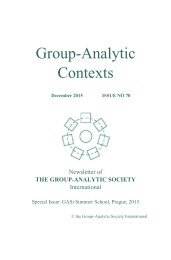Group-Analytic Contexts, Issue 80, June 2018
You also want an ePaper? Increase the reach of your titles
YUMPU automatically turns print PDFs into web optimized ePapers that Google loves.
CONTEXTS’ COLUMNISTS<br />
Quantitative Unease<br />
By Susanne Vosmer<br />
Newsletter – Summer <strong>2018</strong> 83<br />
A column dedicated to demystifying psychotherapy research –<br />
love it, hate it, or both…at least try to know what it’s all about!<br />
Designing Your Research Study<br />
Making lists isn’t everybody’s cup of tea but quite useful when it<br />
comes to research. Let’s assume that you’ll have nothing better to do<br />
on a rainy Sunday morning than thinking about the design of a study.<br />
You’ll grab a piece of paper and a pen - or your gadget if you prefer<br />
to type. Then you’ll jot down all the research ‘issues’ (‘problems’) that<br />
interest you.<br />
Next, you’ll look at your list and … no, you won’t sigh!<br />
You’ll glance at your favourite toy, which will come in handy now.<br />
You can use your tablet, smart phone iPad or your laptop to conduct a<br />
‘review of the literature’. Sounds grand? No, it isn’t. It simply means<br />
that you’ll find out what others have written about your issues of<br />
interest. And by ‘issues’ I don’t mean whether you still resent your<br />
parents’ lack of originality.<br />
If your internet is working and you have access to databases,<br />
fantastic. Then you can search journals, periodicals and registered<br />
trials by typing in relevant search terms. This enables you to identify<br />
papers that have been published on your topic of interest. If you don’t<br />
have access to journals or databases, use ‘Google Scholar’ or go into<br />
a library. Or even better, use them all. That isn’t greed, it’s necessity.<br />
When reviewing the literature, you’ve several options. If<br />
you’ve identified a gap (or void) in your area of interest (your<br />
‘research problems’), you generate a list of ‘research questions’<br />
(potentially suitable questions that you’d like to research). Or, if<br />
you’ve seen that someone else has already researched your ‘favourite<br />
issues’ - forget work, lovers, parents… we are talking research now -<br />
but not in their totality, you can extend a previously conducted study<br />
and include particular aspects of interest to you. Again, make a list and<br />
write down what these are. Or, if you’ve detected flaws in the studies<br />
you’ve come across and think that you’re smarter, because you’re a<br />
group analyst and can iron out their flaws, jot them down.













